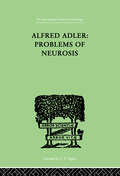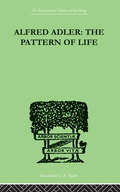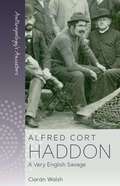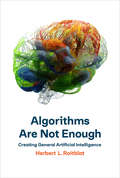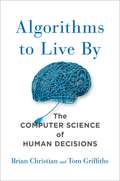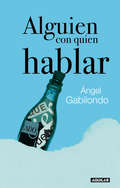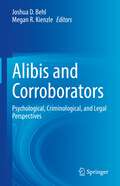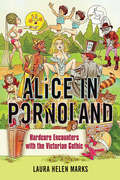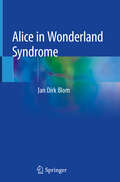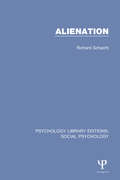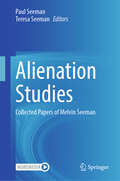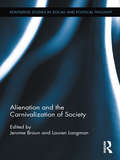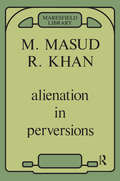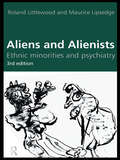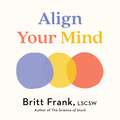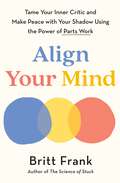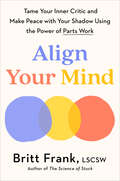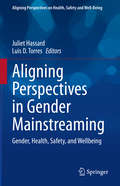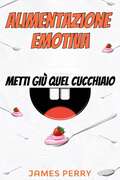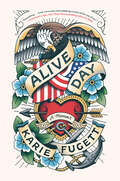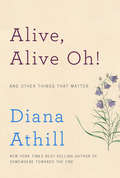- Table View
- List View
Alfred Adler: A Book of Case-Histories (International Library Of Psychology Ser.)
by Mairet, PhilippeFirst Published in 1999. Routledge is an imprint of Taylor & Francis, an informa company.
Alfred Adler: The Pattern of Life
by W. Beran WolfeFirst Published in 1999. Routledge is an imprint of Taylor & Francis, an informa company.
Alfred C. Kinsey: A Life
by James H. JonesThe hidden life of Alfred C. Kinsey, the principal architect of the sexual revolution. In this brilliant, groundbreaking biography, twenty years in the making, James H. Jones presents a moving and even shocking portrait of the man who pierced the veil of reticence surrounding human sexuality. Jones shows that the public image Alfred Kinsey cultivated of disinterested biologist was in fact a carefully crafted public persona. By any measure he was an extraordinary man--and a man with secrets. Drawing upon never before disclosed facts about Kinsey's childhood, Jones traces the roots of Kinsey's scholarly interest in human sexuality to his tortured upbringing. Between the sexual tensions of the culture and Kinsey's devoutly religious family, Jones depicts Kinsey emerging from childhood with psychological trauma but determined to rescue humanity from the emotional and sexual repression he had suffered. New facts about his marriage, family life, and relationships with students and colleagues enrich this portrait of the complicated, troubled man who transformed the state of public discourse on human sexuality.
Alfred Cort Haddon: A Very English Savage (Anthropology's Ancestors #5)
by Ciarán WalshAn innovative account of one of the least-understood characters in the history of anthropology. Using previously overlooked, primary sources Ciarán Walsh argues that Haddon, the grandson of anti-slavery activists, set out to revolutionize anthropology in the 1890s in association with a network of anarcho-utopian activists and philosophers. He regards most of what has been written about Haddon in the past as a form of disciplinary folklore shaped by a theory of scientific revolutions. The main action takes place in Ireland, where Haddon adopted the persona of a very English savage in a new form of performed photo-ethnography that constituted a singularly modernist achievement in anthropology. From the Introduction: Alfred Cort Haddon was written out of the story of anthropology for the same reasons that make him interesting today. He was passionately committed to the protection of simpler societies and their civilisations from colonists and their supporters in parliament and the armed forces.
Alginate Biomaterial: Drug Delivery Strategies and Biomedical Engineering
by Sougata Jana Subrata JanaThis book focuses on recent trends of research on alginate-based biomaterials in Drug Delivery strategies and biomedical engineering. It contains the widely used alginate-based biomaterials as micro to nano-controlled drug delivery (oral, ocular delivery, topical delivery, etc.) and its fabrication technology, characterization, and biomedical aspects (such as cancer therapy, tissue engineering, gene delivery, vaccine delivery, enzyme immobilization, wound healing, dental applications, etc.) in a single book. The chapters cover updated information, current research trends, informatics, and all aspects of applications. Alginate is a U.S. Food and Drug Administration (FDA)-approved natural biomaterial and has diverse biomedical applications. In recent years, researchers and scientists are working on the alginate-based drug delivery systems that have been designed and characterized as a matrix, micro to nanocarriers, fibers, composite/scaffolds, etc. Alginate has versatile properties such as biodegradable, biocompatible, nontoxic, and easily available. This book especially highlights both the drug delivery strategies and biomedical engineering aspects such as controlled drug delivery, drug targeting to the site of action, cancer therapy, gene and vaccine delivery, enzyme immobilization, tissue engineering, and regenerative medicine.
Algorithms Are Not Enough: Creating General Artificial Intelligence
by Herbert L. RoitblatWhy a new approach is needed in the quest for general artificial intelligence.Since the inception of artificial intelligence, we have been warned about the imminent arrival of computational systems that can replicate human thought processes. Before we know it, computers will become so intelligent that humans will be lucky to kept as pets. And yet, although artificial intelligence has become increasingly sophisticated--with such achievements as driverless cars and humanless chess-playing--computer science has not yet created general artificial intelligence. In Algorithms Are Not Enough, Herbert Roitblat explains how artificial general intelligence may be possible and why a robopocalypse is neither imminent, nor likely.
Algorithms To Live By: What Computers Can Teach Us About Solving Human Problems
by Brian Christian Tom GriffithsA fascinating exploration of how insights from computer algorithms can be applied to our everyday lives, helping to solve common decision-making problems and illuminate the workings of the human mind All our lives are constrained by limited space and time, limits that give rise to a particular set of problems. What should we do, or leave undone, in a day or a lifetime? How much messiness should we accept? What balance of new activities and familiar favorites is the most fulfilling? These may seem like uniquely human quandaries, but they are not: computers, too, face the same constraints, so computer scientists have been grappling with their version of such issues for decades. And the solutions they've found have much to teach us. In a dazzlingly interdisciplinary work, acclaimed author Brian Christian and cognitive scientist Tom Griffiths show how the algorithms used by computers can also untangle very human questions. They explain how to have better hunches and when to leave things to chance, how to deal with overwhelming choices and how best to connect with others. From finding a spouse to finding a parking spot, from organizing one's inbox to understanding the workings of memory, Algorithms to Live By transforms the wisdom of computer science into strategies for human living.
Algorithms to Live By: The Computer Science of Human Decisions
by Brian Christian Tom GriffithsA fascinating exploration of how computer algorithms can be applied to our everyday lives, helping to solve common decision-making problems and illuminate the workings of the human mindAll our lives are constrained by limited space and time, limits that give rise to a particular set of problems. What should we do, or leave undone, in a day or a lifetime? How much messiness should we accept? What balance of new activities and familiar favourites is the most fulfilling? These may seem like uniquely human quandaries, but they are not: computers, too, face the same constraints, so computer scientists have been grappling with their version of such problems for decades. And the solutions they've found have much to teach us. In a dazzlingly interdisciplinary work, acclaimed author Brian Christian (who holds degrees in computer science, philosophy, and poetry, and works at the intersection of all three) and Tom Griffiths (a UC Berkeley professor of cognitive science and psychology) show how the simple, precise algorithms used by computers can also untangle very human questions. They explain how to have better hunches and when to leave things to chance, how to deal with overwhelming choices and how best to connect with others. From finding a spouse to finding a parking spot, from organizing one's inbox to understanding the workings of human memory, Algorithms to Live By transforms the wisdom of computer science into strategies for human living.
Alguien con quien hablar
by Ángel GabilondoAlguien con quien hablar no pretende ser una lección ni darla. Lejos de la sofisticación académica, desea ofrecerse como un acto de comunicación esencialmente humano. Todos necesitamos que alguien nos acompañe, que esté cerca, que nos escuche, que nos diga. Pero alguien no es uno o una cualquiera, no nos es indiferente, y dar con él, con ella, resulta decisivo. Tal vez se trate más de una capacidad de atender, de escuchar, de estar abierto y dispuesto, no sólo a recibir, sino a entregarse, a darse. Y dejar hablar no es un simple gesto de permisividad, es un acto de reconocimiento. Exige crear condiciones, un territorio propicio, para la palabra ajena. De la amistad y el sexo, del placer, el deseo y el erotismo, de la mentira, el malentendido o el silencio, de la serenidad y la alegría nos habla Ángel Gabilondo, entre otros temas, dibujando un espacio de encuentro en el que la palabra es protagonista.
Alibis and Corroborators: Psychological, Criminological, and Legal Perspectives
by Joshua D. Behl Megan R. KienzleThis book aims to increase understanding of alibis and corroborators, examining the role alibis play – or fail to play – in innocence cases. It analyses the factors that can influence the suspect, the defense team, the alibi corroborator, and ultimately the alibi statement itself. Recognition of and reactions to wrongful convictions have been on the rise as researchers and society take a closer, more critical look at America’s criminal justice system. In addition to serving as a complete review of the science, this volume discusses issues such as alibi generation; alibi believability; a proposed theory of alibis; international comparisons of issues in alibi corroboration; age and gender differences in alibi corroboration; attorney perceptions and use of alibi evidence; and erroneous alibis. Offering an in-depth, empirical view, this book will appeal to students and researchers interested in Criminology, Legal Psychology, Social Psychology, Law, and practitioners in our legal and criminal justice systems who are making tough decisions about this distinctive witness type.
Alice in Pornoland: Hardcore Encounters with the Victorian Gothic (Feminist Media Studies #21)
by Laura Helen MarksThe unquenchable thirst of Dracula. The animal lust of Mr. Hyde. The acquiescence of Lewis Carroll's Alice. Victorian literature--with its overtones of prudishness, respectability, and Old World hypocrisy--belies a subverted eroticism. The Victorian Gothic is monstrous but restrained, repressed but perverse, static but transformative, and preoccupied by gender and sexuality in both regressive and progressive ways. Laura Helen Marks investigates the contradictions and seesawing gender dynamics in Victorian-inspired adult films and looks at why pornographers persist in drawing substance and meaning from the era's Gothic tales. She focuses on the particular Victorianness that pornography prefers, and the mythologies of the Victorian era that fuel today's pornographic fantasies. In turn, she exposes what porning the Victorians shows us about pornography as a genre. A bold foray into theory and other forbidden places, Alice in Pornoland reveals how modern-day Victorian Gothic pornography constantly emphasizes, navigates, transgresses, and renegotiates issues of gender, sexuality, and race.
Alice in Wonderland Syndrome
by Jan Dirk BlomThe book provides the first state-of-the-art overview of Alice in Wonderland syndrome, an enigmatic neurological condition characterised by perceptual distortions (for example, seeing things as being larger or smaller than they actually are; seeing human faces change into animal faces; feeling one’s body growing larger or smaller; experiencing time as slowing down or speeding up; etc.). It describes the clinical presentation of the syndrome, including its huge variety of symptoms and the variability of its natural course. The book starts out with several vivid case vignettes from the author’s clinical practice, and then explains how and why the concept was introduced. In addition, it explains what is currently known about the underlying medical conditions and brain mechanisms, proposes a diagnostic algorithm, and makes recommendations for treatment. Throughout the book, a recurring question is whether or not Charles Dodgson (aka Lewis Carroll) suffered from the symptoms he described so aptly in his famous children’s book, Alice’s Adventures in Wonderland. Accordingly, the book should appeal to anyone interested in the brain and its disorders, as well as readers interested in the life of Lewis Carroll.
Alien Landscapes?
by Jonathan GloverWe have made huge progress in understanding the biology of mental illnesses, but comparatively little in interpreting them at the psychological level. The eminent philosopher Jonathan Glover believes that there is real hope of progress in the human interpretation of disordered minds. The challenge is that the inner worlds of people with psychiatric disorders can seem strange, like alien landscapes, and this strangeness can deter attempts at understanding. Do people with disorders share enough psychology with other people to make interpretation possible? To explore this question, Glover tackles the hard casesâe"the inner worlds of hospitalized violent criminals, of people with delusions, and of those diagnosed with autism or schizophrenia. Their first-person accounts offer glimpses of inner worlds behind apparently bizarre psychiatric conditions and allow us to begin to learn the âeoelanguageâe#157; used to express psychiatric disturbance. Art by psychiatric patients, or by such complex figures as van Gogh and William Blake, give insight when interpreted from Gloverâe(tm)s unique perspective. He also draws on dark chapters in psychiatryâe(tm)s past to show the importance of not medicalizing behavior that merely transgresses social norms. And finally, Glover suggests values, especially those linked with agency and identity, to guide how the boundaries of psychiatry should be drawn. Seamlessly blending philosophy, science, literature, and art, Alien Landscapes? is both a sustained defense of humanistic psychological interpretation and a compelling example of the rich and generous approach to mental life for which it argues.
Alienation (Psychology Library Editions: Social Psychology)
by Richard SchachtFirst published in 1970, original blurb: ‘Alienation’ is the catchword of our time. It has been applied to everything from the new politics to the anti-heroes of today’s films. But what does it mean to say that someone is alienated? Is alienation a state of mind, or a relationship? If modern man is indeed alienated, is it from his work, his government, his society, or himself – or from all of these? Richard Schacht, in this intelligent analysis, gets to the root of these questions. Examining the concept of alienation in the works of Hegel and Marx, he gives a clear account of the origins of the modern usage of the term. Among the many insights to be gained from this analysis is a clear understanding of Hegel’s influence on Marx in this most crucial area. Mr Schacht goes on to discuss the concept of alienation in recent philosophical and sociological literature, particularly in the writings of Erich Fromm. Here he finds a great deal of confusion, which has resulted in a series of almost universally unquestioned misconceptions. This, then, is a book for all of us who use – and mis-use – the term ‘alienation’, and who are interested in the concepts it brings to mind. The arguments of Professor Walter Kaufmann’s introductory essay provide a useful background for Mr Schacht’s analysis. In this essay, Professor Kaufmann states that ‘henceforth nobody should write about alienation without first reading Schacht’s book.’
Alienation Studies: Collected Papers of Melvin Seeman
by Paul Seeman Teresa SeemanThis book compiles cross-cultural studies on alienation undertaken by the late Dr. Melvin Seeman, including relevant historical and theoretical contexts and analyses related to the ongoing development of the alienation model and its counterparts in the behavioral sciences. Chapters track the development of this model across a half-century of interdisciplinary research, encompassing various research partnerships over the years.
Alienation and the Carnivalization of Society (Routledge Studies in Social and Political Thought)
by Jerome Braun Lauren LangmanThis book examines alienation from both a sociological and psychoanalytic perspective, revisiting classic treatments of the topic (Marx, Simmel, Weber) and exploring its relevance to understanding post-modern consumer society. It examines the escapist potentials for good and for ill in modern society - those fostered by commercial interests, and those maintained by individuals and groups as their form of resisting alienation.
Alienation in Perversions
by Masud KhanPerversions and borderline states were, by accident of fate, Masud Khan's chief preoccupation in his clinical work during the last three decades of his life. In an earlier volume, The Privacy of the Self, he presented what he called the natural and private crystallization of his experience with his patients and teachers; notably, in the latter category, Anna Freud, John Rickman and D.W. Winnicott. In this later book he takes his cue from Freud who, as he says, diagnosed the sickness of Western Judaeo-Christian cultures in terms of "the person alienated from himself". Masud Khan's basic argument, succinctly stated in his Preface, is that "the pervert puts an impersonal object between his desire and his accomplice. This object can be a stereotype fantasy, a gadget or a pornographic image. All three alienate the pervert from himself, as, alas, from the object of desire".With its wealth of clinical and theoretical insights, Masud Khan's Alienation in Perversions makes a major contribution to our understanding of perversion formation.
Aliens and Alienists: Ethnic Minorities and Psychiatry (Pelican Ser.)
by Maurice Lipsedge Roland LittlewoodIn this classic text the authors examine the links between racism, psychological ill health and inadequate treatment of ethnic minorities. Through a series of case studies they discuss: * the psychological legacy of colonialism and slavery * the racist bias in psychiatric and psychological theory * diagnostic bias * the role of religion in mental health or illness * the value of anthropological and pschoanalytic insights. The concluding chapter in this edition reviews the development of 'transcultural psychiatry' and summarises changes in administration of the Mental Health Act.
Align Your Mind: Tame Your Inner Critic and Make Peace with Your Shadow Using the Power of Parts Work
by Britt Frank'This is not your usual self-help book but a masterpiece of theory, memoir, and clear instruction, complete with thought-provoking quotes from a wide range of sources . . . Do your life a favor and get this profound book. It's written with expert knowledge yet offered in the spirit of the safest friendship you could ever experience.'-LINDSAY C. GIBSON, PsyD, clinical psychologist and New York Times bestselling author of Adult Children of Emotionally Immature Parents Meet your inner critic, your inner teen, and your inner shadow in this engaging guide to taming anxiety, healing trauma, and overcoming self-doubt with Parts WorkWhat is "Parts Work"?You contain multitudes. At any given moment, your inner critic might be questioning whether you're an imposter, and your inner child might be yearning for compassion and self-care. These parts don't make you broken-they make you human. Parts Work allows you an all-access pass to wholeness by understanding, befriending, and leading the multiple voices within yourself.In this eye-opening and practical guide, psychotherapist Britt Frank introduces you to your parts: from impulsive inner parts and shadowy hidden parts to your inner child and more. You'll learn to listen to the conversations inside yourself and identify the core needs behind your habits and behaviors. Using tools and exercises ranging from self-dialogue to embodiment techniques and more, you'll discover new ways to nurture and harmonize these inner voices-even when you feel overwhelmed and low in motivation.Grounded in the latest research on Parts Work and Internal Family Systems, and offering proven techniques from Frank's clinical practice and personal challenges, this engaging guide is a user manual to your own mind-and presents a road map for finding peace, confidence, and a deeper understanding of who you truly are.
Align Your Mind: Tame Your Inner Critic and Make Peace with Your Shadow Using the Power of Parts Work
by Britt Frank'This is not your usual self-help book but a masterpiece of theory, memoir, and clear instruction, complete with thought-provoking quotes from a wide range of sources . . . Do your life a favor and get this profound book. It's written with expert knowledge yet offered in the spirit of the safest friendship you could ever experience.'-LINDSAY C. GIBSON, PsyD, clinical psychologist and New York Times bestselling author of Adult Children of Emotionally Immature Parents Meet your inner critic, your inner teen, and your inner shadow in this engaging guide to taming anxiety, healing trauma, and overcoming self-doubt with Parts WorkWhat is "Parts Work"?You contain multitudes. At any given moment, your inner critic might be questioning whether you're an imposter, and your inner child might be yearning for compassion and self-care. These parts don't make you broken-they make you human. Parts Work allows you an all-access pass to wholeness by understanding, befriending, and leading the multiple voices within yourself.In this eye-opening and practical guide, psychotherapist Britt Frank introduces you to your parts: from impulsive inner parts and shadowy hidden parts to your inner child and more. You'll learn to listen to the conversations inside yourself and identify the core needs behind your habits and behaviors. Using tools and exercises ranging from self-dialogue to embodiment techniques and more, you'll discover new ways to nurture and harmonize these inner voices-even when you feel overwhelmed and low in motivation.Grounded in the latest research on Parts Work and Internal Family Systems, and offering proven techniques from Frank's clinical practice and personal challenges, this engaging guide is a user manual to your own mind-and presents a road map for finding peace, confidence, and a deeper understanding of who you truly are.
Align Your Mind: Tame Your Inner Critic and Make Peace with Your Shadow Using the Power of Parts Work
by Britt Frank LSCSWMeet your inner critic, your inner teen, and your inner shadow in this engaging guide to taming anxiety, healing trauma, and overcoming self-doubt with Parts WorkWhat is &“Parts Work&”?You contain multitudes. At any given moment, your inner critic might be questioning whether you&’re an imposter, and your inner child might be yearning for compassion and self-care. These parts don&’t make you broken—they make you human. Parts Work allows you an all-access pass to wholeness by understanding, befriending, and leading the multiple voices within yourself.In this eye-opening and practical guide, psychotherapist Britt Frank introduces you to your parts: from impulsive inner parts and shadowy hidden parts to your inner child and more. You&’ll learn to listen to the conversations inside yourself and identify the core needs behind your habits and behaviors. Using tools and exercises ranging from self-dialogue to embodiment techniques and more, you&’ll discover new ways to nurture and harmonize these inner voices—even when you feel overwhelmed and low in motivation.Grounded in the latest research on Parts Work and Internal Family Systems, and offering proven techniques from Frank&’s clinical practice and personal challenges, this engaging guide is a user manual to your own mind—and presents a road map for finding peace, confidence, and a deeper understanding of who you truly are.
Aligning Perspectives in Gender Mainstreaming: Gender, Health, Safety, and Wellbeing (Aligning Perspectives on Health, Safety and Well-Being)
by Juliet Hassard Luis D. TorresThis book brings together various threads of research in the field of gender mainstreaming. It aids in further supporting and understanding the role of gender in health and safety research, practice, and policy. It looks at gender mainstreaming as being recognised as key in cultivating sustainable worker health and working systems due to it being a central component of many international policy initiatives. This book deals with gender mainstreaming being advocated at a policy level, while focusing on the limited recognition and discourse on the issue of gender and its direct and indirect association to workers’ health in the field of occupational health and safety. This book addresses problems facing gender-sensitive policies and outlines and reflects upon current best practice principles and practices to support the development and implementation of policies, interventions, and research initiatives.
Alimentazione emotiva: metti giù quel cucchiaio
by James PerrySoffri di alimentazione emotiva, disturbo da binge eating o bulimia? Vuoi cambiare il tuo rapporto con il cibo? Vuoi guardare in profondità dentro di te e trovare le cause delle tue lotte quotidiane? Se vi trovate a lottare con una di queste forme di alimentazione disordinata, questo libro è la guida di cui avete bisogno. Continua a leggere per scoprire esattamente cosa ti insegnerà questo libro. Leggendo questo libro, imparerai quanto segue e molto, molto di più! - Cos'è il mangiare emotivo? - Cos'è il binge eating? - Cos'è la bulimia? - Perché le persone si abbuffano? - Perché le persone hanno la bulimia? - Perché le persone mangiano emotivamente? - Ricerca scientifica sui disturbi alimentari e perché esistono - Comprendere la neuroscienza delle sostanze chimiche del cervello e del cibo - Come combattere le abbuffate - Come vincere la bulimia - Come non farsi vincere dal mangiare emotivo - Come iniziare a fare buone scelte - Come usare il mangiare intuitivo per cambiare la propria vita - Cos'è il mangiare intuitivo? - Le basi del mangiare intuitivo - Che tipo di alimenti scegliere? - Come sviluppare e utilizzare modelli di pensiero più sani - Come far durare queste scelte più sane - Dove andare a cercare aiuto se il tuo mangiare disordinato diventa incontrollabile - Come cercare una terapia o una consulenza Se vi state chiedendo cosa potete fare per il vostro disordine alimentare, questo libro vi fornirà una guida passo dopo passo su come potete iniziare a recuperare e cambiare la vostra vita per sempre. In questo libro non c'è solo questa guida passo dopo passo, ma una quantità di informazioni che vi aiuterà a capire meglio esattamente perché si soffre di alimentazione disordinata. Il trattamento di un problema inizia sempre con l'identificazione del problema stesso. Questo libro vi aiuterà a identificare il problema più profondo. Esistono pochi libri che dispongono di una guida interattiva p
Alive Day: A Memoir
by Karie FugettA searing, unflinchingly intimate memoir about one young couple caught up in the machinery of America&’s military system, learning to live and love through war and all that comes after&“Astonishing . . . both a love story and a gripping account of the cost of war.&”—Stephanie Land, bestselling author of Maid and ClassKarie Fugett is living out of her car in a Kmart parking lot when her boyfriend, Cleve, suggests, &“Maybe we could get married or somethin&’.&” Karie says yes out of love but also out of convenience. As a twenty-year-old high school dropout who ran away from her family and recently lost her job, Karie has nowhere else to turn. Just months after they elope, Cleve&’s Marine unit is deployed to Iraq. It isn&’t long before Karie gets the call: Cleve&’s Humvee has been hit by an IED, and he&’s suffered severe injuries.Karie rushes to Walter Reed, where she&’s told it&’s a miracle that her husband has survived. &“Happy Alive Day, man,&” a fellow vet says to Cleve, explaining that this will always be the day when he was given a second chance at life. Newlyweds barely out of their teens, Karie and Cleve are thrust into utterly foreign roles. Karie tries to adapt to her job as a caregiver, navigating the labyrinthine system of veterans affairs, hospital bureaucracies, and doctors who do little more than shrug when she raises concerns about Cleve&’s dependency on painkillers. It is clear to Karie that Cleve is using opiates to dull a pain that is more than physical. She catches his first overdose, but what if she can&’t save him a second time? Will she still be able to save herself?Fugett&’s story depicts an oft-overlooked reality of war: the experience of the many thousands of caregivers and spouses—mostly women, mostly young, mostly poor—whose lives have been shattered by battles fought against enemies abroad and against addiction at home. Tender, vivid, and laced with dark humor, Alive Day is at once an epic and engrossing love story, a testament to the resilience of the human spirit, and a powerful indictment of the sins of a nation.
Alive, Alive Oh!: And Other Things That Matter
by Diana Athill“An invitation to sit a spell with an intractable and witty friend.” —New York Times Book Review What will you remember if you live to be 100? Diana Athill charmed readers with her prize-winning memoir Somewhere Towards the End, which transformed her into an unexpected literary star. Now, on the eve of her ninety-eighth birthday, Athill has written a sequel every bit as unsentimental, candid, and beguiling as her most beloved work. Writing from her cozy room in Highgate, London, Diana begins to reflect on the things that matter after a lifetime of remarkable experiences, and the memories that have risen to the surface and sustain her in her very old age. “My two valuable lessons are: avoid romanticism and abhor possessiveness,” she writes. In warm, engaging prose she describes the bucolic pleasures of her grandmother’s garden and the wonders of traveling as a young woman in Europe after the end of the Second World War. As her vivid, textured memories range across the decades, she relates with unflinching candor her harrowing experience as an expectant mother in her forties and crafts unforgettable portraits of friends, writers, and lovers. A pure joy to read, Alive, Alive Oh! sparkles with wise and often very funny reflections on the condition of being old. Athill reminds us of the joy and richness of every stage of life—and what it means to live life fully, without regrets.
